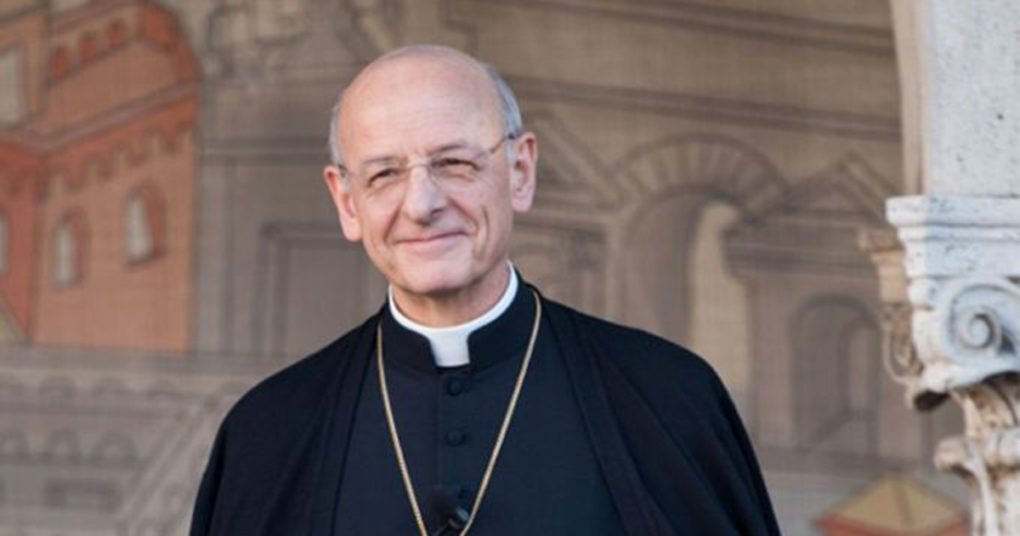1. Lumen Christi! This proclamation that the Church announces to us three times at the beginning of the Paschal Vigil brings us a truth that fills us with joy. Christ’s light blazes a trail through the shadows of sin and death! Jesus has risen! This is the joyful message that we want to receive anew on this holy night.
We have tried to live the Paschal Triduum intensely, contemplating Jesus’ self-giving for us: from the institution of the Eucharist at the Last Supper to his death on the Cross. The Gospel this evening shows us that the darkness of Calvary is not the last word. The holy women who accompanied our Lord in the Passion lead us towards the light of the Resurrection. Jesus rewards their affection shown in embalming his Body by making them the first bearers of the joy of Easter.
2. Like the holy women, we too receive the news of Jesus’ Resurrection as a new light for our lives. Saint Paul reminds the Romans, in the passage from the letter we just read, that we unite ourselves to the death of Jesus “so that as Christ was raised from the dead by the glory of the Father, we too might walk in newness of life” (Rom 6:4). Easter announces to us that we are not bound by our past sins, by the weight of our previous errors, by the limitations we see in our lives. Therefore the Apostle insists: “consider yourselves dead to sin and alive to God in Christ Jesus” (Rom6:11).
On this night, we want to respond to our Lord’s invitation to undertake a new life. But what is this new life He calls us to? We might be tempted to think that everything we have experienced these days will soon pass, and we will return to our old routines: the same work, the same people, the same problems. Isn’t it naïve to think that simply because we have attended some ceremonies and prayed a bit more, the circumstances around us will change?
What does this newness consist in? In the light of faith—vivified by charity, sustained by hope—that fills our life. As Saint Josemaria tells us, “this certainty which the faith gives enables us to look at everything in a new light. And everything, while remaining exactly the same becomes different, because it is an expression of God’s love” (Christ is Passing By, 144). By faith we know that Jesus is alongside us in our daily life, helping us discover its true meaning. And then we carry out the same work, but with love for God and a spirit of service; we fight against routine in our dealings with others and, with the creativity of charity, we discover new ways to make their lives happy; and we are grateful for the Christian formation we receive and strive to grasp it more fully with new lights.
3. After announcing to the holy women the news of Jesus’ Resurrection, the angel adds: “go, tell his disciples and Peter that he is going before you to Galilee; there you will see him, as he told you” (Mk 16:7). The disciples are told to return to Galilee, to where everything began for them, to the land they travelled through each day with the Master during the years of his preaching.
The same call is also addressed to us: to go back to our Galilee, to our daily life, but bringing to it the light and joy of Easter. As Pope Francis told us several years ago: “To return to Galilee means above all to return to that blazing light with which God’s grace touched me at the start of the journey. From that flame I can light a fire for today and every day, and bring heat and light to my brothers and sisters” (Homily in the Easter Vigil, 19 April 2014).
So let us welcome this invitation from our Lord. May Jesus’ Resurrection be for us a source of joy. Let us receive the light He wants to give us and share it with those around us. Like the holy women, let us announce with joy the truth that Christ is alive. And let us ask for the help of our Lady, whose face we contemplate tonight shining with joy at the Resurrection of her Son.
About the Author: Monsignor Fernando Ocáriz
Monsignor Fernando Ocáriz is the Prelate of Opus Dei. This homily was preached at the Easter Vigil in Our Lady, Queen of Peace church, Rome on March 31, 2018. It is reprinted from the website www.opusdei.ie.

